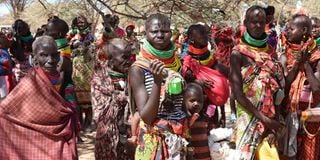Looking at the climate crisis through a justice lens

Locals wait for their rations of relief food distribution by President William Ruto to hunger victims due to drought, at Nakaalei in Turkana County on November 5, 2022.
What you need to know:
- The impacts of climate change are not felt equally globally; they disproportionately affect vulnerable communities, especially in low-income countries.
Climate change and social injustices are intricately linked, forming a complex web of challenges that disproportionately affect marginalised communities worldwide. As the climate crisis escalates, it exacerbates existing inequalities rooted in socioeconomic status, race, gender and geographic location.
This relationship is characterised by a vicious cycle where social injustices heighten vulnerability to climate impacts, perpetuating and deepening these injustices. Understanding this dynamic is crucial for effectively addressing climate change and its intensifying social inequities.
The Sustainable Development Goals (SDGs) established by the United Nations provide a framework for tackling these interconnected issues. Climate change threatens the progress of nearly all SDGs, particularly those focused on poverty reduction (SDG 1), gender equality (SDG 5), and reducing inequalities (SDG 10). Climate-related disasters are becoming more frequent and severe, disproportionately impacting low-income communities and marginalised groups who often lack the resources to adapt or recover effectively.
The impacts of climate change are not felt equally globally; they disproportionately affect vulnerable communities, especially in low-income countries. These groups frequently lack the necessary resources to adapt to climate change or recover from disasters, making them more susceptible to adverse effects such as extreme weather events, rising sea levels, and food insecurity.
For instance, individuals in low- and middle-income countries are significantly more likely to be displaced by extreme weather than those in wealthier nations. Their reliance on agriculture, heavily influenced by shifting weather patterns, leads to crop failures and increased food prices, deepening their economic vulnerability.
Gender inequality further complicates the landscape of climate change impacts. Women and girls face distinct challenges during climate crises; they are often responsible for gathering water and food, tasks that become increasingly difficult during droughts or floods. Moreover, in disaster situations, women are at heightened risk of violence and exploitation. The intersectionality of gender and climate change highlights how systemic inequalities can exacerbate the challenges faced by women in vulnerable communities.
Racial disparities also play a significant role in the disproportionate impacts of climate change. Communities of colour and Indigenous populations frequently reside in areas more susceptible to climate impacts due to historical injustices like redlining and exclusionary zoning practices. Consequently, these communities face higher risks from natural disasters while having fewer resources for recovery.
A PubMed review reported that climatic changes linked to global warming are having a disparate impact on the health of people of colour, with studies showing these communities face higher risks of mortality and respiratory diseases from climate-related events like heat waves and hurricanes. The report further warns that children are particularly vulnerable, with adverse health outcomes more pronounced for infants and children of colour.
The intersection of economic inequality and climate policies underscores the challenges at hand. Many policies to reduce carbon emissions can inadvertently impose more significant burdens on lower-income households through increased energy costs or regressive taxation systems.
For example, while carbon taxes are designed to incentivise emission reductions, poorly structured taxes can disproportionately affect low-income families that spend a larger share of their income on energy. However, evidence suggests redistributing carbon revenues can mitigate these adverse effects by financially supporting vulnerable households.
Addressing social injustice within the context of climate change necessitates a multifaceted approach. Empowering vulnerable communities by involving them in decision-making processes related to climate action is essential; their insights can lead to more effective solutions tailored to their specific needs. Additionally, holding historical polluters, wealthy nations and corporations accountable for their contributions to the climate crisis is crucial. This accountability may include financial reparations aimed at helping vulnerable countries adapt to climate impacts.
Integrating social justice into climate action is vital for fostering a more equitable society. Recognising that climate justice is integral to broader social justice movements allows us to address systemic inequalities that enhance resilience against climate impacts. Solutions must prioritise fair resource distribution and ensure that marginalised communities receive equal access to global funds and technology for adaptation and mitigation efforts.
Addressing social injustices in the context of climate change requires a multifaceted approach that includes policy reforms ensuring equitable access to resources and opportunities. One promising strategy is the concept of a “just transition,” which emphasises creating fair job opportunities in the green economy for those historically marginalised. This approach ensures that the costs associated with transitioning to sustainable practices do not disproportionately burden low-income communities.
Investments in infrastructure that enhance resilience such as improved storm water management systems in vulnerable neighbourhoods can also mitigate adverse effects. Furthermore, integrating community voices into decision-making processes is essential for developing practical solutions that reflect the needs of those most affected by climate change. Empowering marginalised communities through education and access to technology can enhance their adaptive capacities and resilience against climate impacts.




